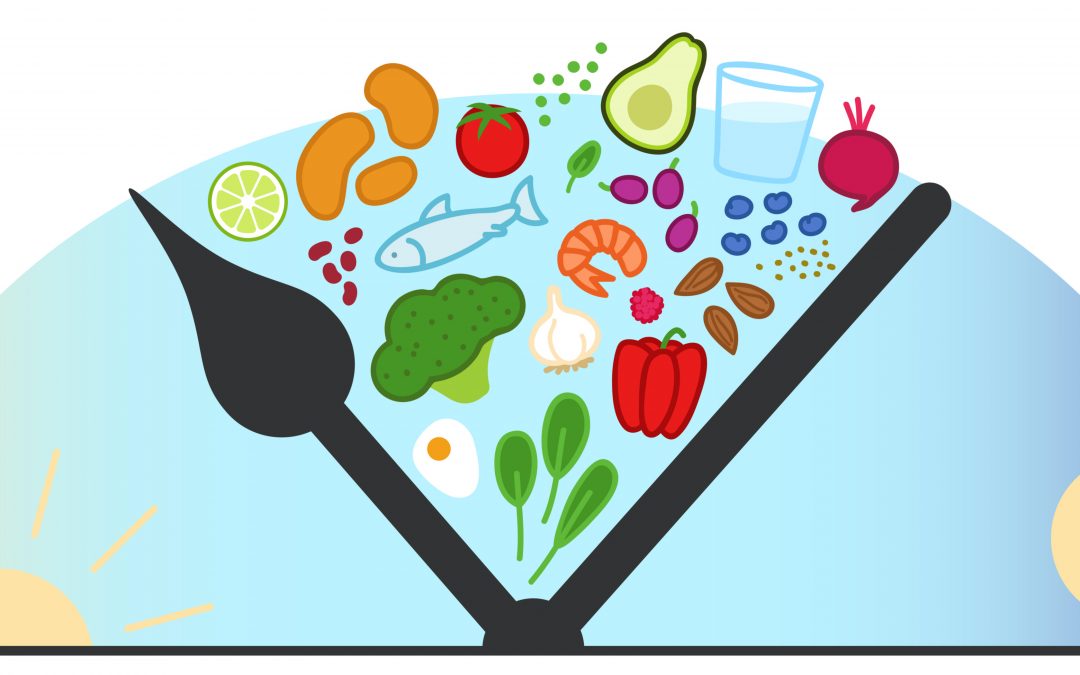What, How and When to eat.
The What
- Eat according to your Ayurvedic Type. You can read more about this here. This ultimately ensures that your digestive fire (Agni) burns sufficiently to digest, metabolise and assimilate the food we eat. Balancing the digestive fire and removing toxins, which can accumulate as a result of undigested food is the principle goal of Ayurvedic therapy.
Nutrition pays a key roll in the health of the digestion and elimination systems of the body and is generally where we experience the first signs of imbalance: gas, bloating, constipation, diarrhoea or indigestion. Don’t ignore it or just treat the symptoms. The cause is generally a result of eating incompatible foods.
The How and When
There’s so much research on this subject. Here we’ll condense some of the research and present it from an Ayurvedic perspective.
- According to Ayurvedic principles. We should eat our largest meal when the sun is highest in the sky. At this time of day your digestive fire is at its peak, ready to receive, digest, metabolise and assimilate the food you eat. Don’t skip lunch, especially if you are a Pitta type – Yes, that’s when the ‘Hanger’ strikes. Try to have lunch as your largest meal of the day.
- Breakfast is the nourishment for the Pitta time of day, when we are more productive, focused, analytical, logical and more responsive to learning. Breaking your fast is whatever signals the liver, stomach and pancreas that the fast is over. Do we all need breakfast? Is it the most important meal of the day? That depends on your Ayurvedic type. Kapha types do well to skip breakfast if they’re not hungry. Vata and Pitta types do well to have a light breakfast, which is gentle on the digestive system. Here are some suggestions: Breakfast. Be more in-tune with your digestion and appetite. if you’re not hungry, don’t eat. If you are hungry, It’s fine to have a bigger breakfast as your insulin response is better in the morning. Try to leave 1 hour between waking and eating breakfast to allow your digestive fire to ‘get going’.
- A carbohydrate (Yin) breakfast is ideal. Crabs for lunch, but less at night. Even though lunch should be your most substantial meal, don’t overeat carbs and fat as this will cause lethargy.
- Try to consume all of your food within a 8-12 hour timeframe. Research suggest that time restricted eating has many positive health benefits: weight loss, improves the natural detoxification process of the body, improves blood sugar control, there beneficial in treating diabetes and pre diabetes symptoms, improved appetite signalling and lower levels of inflammation. Consuming all your food in 8 hours will be difficult for most people but consider eating breakfast at 7.30am, this means finishing your evening meal at 7.30pm and not eating again until breakfast gives your your 12 hour fasting period. You might even introduce 2-3 days per week where you skip breakfast if you are not hungry.
- During the night your digestive system has time to repair, the digestive organs have time to rest and the body spends time in fat burning mode. Why is this important. (esepcially if you are struggling to lose weight). When we eat our body favours fat storage. The digestive process breaks down foods into nutrients and energy and is used and stored. The fat burning process will happen the body realises no more food is available. When we are sleeping and ultimately fasting, the fat burning process dominates.
- For most days try to stick to a regular rhythm of food intake. Not erratic and one which changes daily. The body likes routine.
- Try to stick to 2-3 meals and keep snacking to a minimum. Constant snacking or grazing keeps the digestive fire burning too much throughout the day, stressing the digestive system. The digestive organs of the body are not programmed to be open for business 24 hours a day. Don’t snack after your evening meals and definitely don’t eat just before bed or throughout the night…yes, some people do!! Try to finish you evening meal 2-4 hours before bed.Eating late, snacking after our evening meal prolongs the fat storing phase and reduced the fat burins phase.
Following Ayurvedic principles and our natural cycles will undoubtedly improve our health and well-being.
As we are preparing to transition from Winter to Spring, we will be hosting our Ayurvedic Spring Clean(se) Workshop Friday 27th March 7pm – 8.30pm.
Bring balance and good health through awareness and the principles of Ayurvedic Nutrition and lifestyle practices.
If you would like to read more on research of time restricted eating check out ‘The Circadian Code’ by Dr Satchin Panda PhD.

